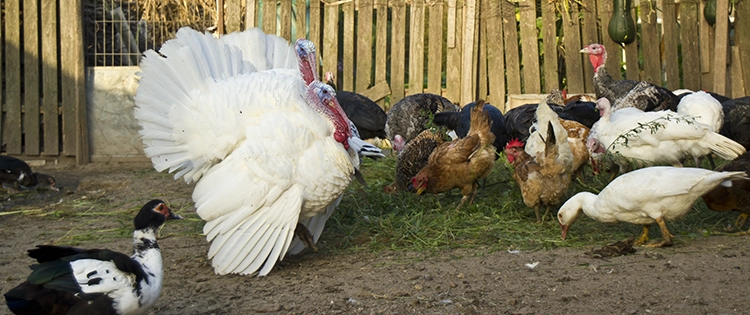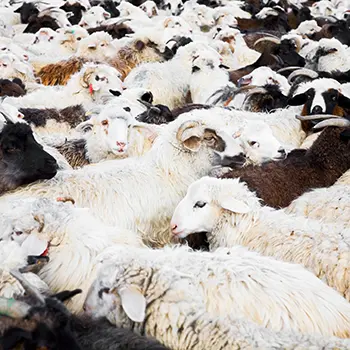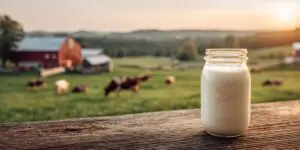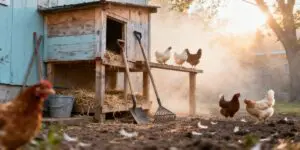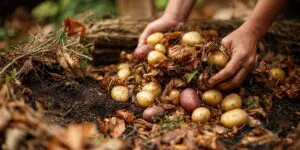Many people believe that we should house all kinds of different livestock together, the way our ancestors may have. Sometimes, it can be beneficial to pasture different types of livestock together, but that only applies to those with abundant land so that each species can have its own space.
However, with today’s small parcels of land, keeping certain livestock together is often a bad idea, especially if you only have a small run for them to share. When there is not enough land, the animals start competing for resources (space, water, food) and can become very aggressive or, at the very least, highly stressed.
Another issue with keeping livestock together is that they should never share the same housing since each will have very different needs. Fencing requirements can also differ; a fence holding one species may not hold or may even harm another. Another factor is that they cannot be fed together since the diet of one species is sometimes detrimental to the health of another, such as how dogs should not eat cat food. This means no on-demand feeders can be used when livestock cohabitate.
These differences in shelter and feeding requirements can make creating a one-size-fits-all solution challenging, even if you have enough room to avoid the inevitable competition for resources.
Here are more specific examples of livestock that may do very poorly when housed together.
Chickens, Ducks, Geese, and Turkeys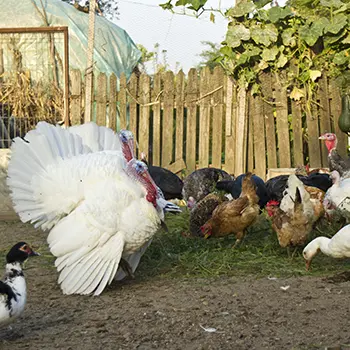
Even though people often do, you shouldn’t keep ducks, geese, and chickens together. The problem with this is that for your ducks and geese to be happy and healthy, they need water to swim and bathe in, so they are best kept in an enclosed area with a pond or at least a swimming pool. Chickens, especially the young ones, should never have open water since they are known to drown in it. For the same reason, chickens shouldn’t be kept with large animals requiring a water trough since they may also drown in those.
The other problem is that every chicken needs about 10 ft2 of exercise run, while a duck requires more, about 16 ft2. When you mix species, those minimum numbers only go up, so you are not actually saving space. Unless they have plenty of extra room, the roosters and drakes (the males of each) are typically aggressive towards the other birds, attacking and injuring them or worse.
Finally, chickens and turkeys also shouldn’t be housed or penned together. Turkeys are much larger than chickens and need even more space. Even still, they usually will pick on, injure, or even kill chickens. If you introduce them young enough, you could prevent that. However, that presents another problem. Turkeys can spread a fatal blackhead disease to young chickens, so it’s not recommended to introduce them to a chicken run until they are all about 6 months old, once they have developed some immunity. But by then, the turkeys will be big enough to start attacking the smaller chickens.
Ducks, Geese, and Other Livestock
Ducks and geese should have water to bathe in, and they will defecate in that water. Especially if the ducks do not have a pond, they will use the water troughs for your large animals as a water source for drinking and bathing. This could breed parasites that could be problematic for your other livestock. A trough should never double as a bath.
Sheep and Goats
Sheep and goats can be kept together in a pasture if the space is large enough since goats browse on shrubs and twigs and sheep graze on grass. However, the problem is when they are contained in a run.
One issue is that goats need better fencing and shelter since they love to climb. Another problem is that the rams (male sheep) and billies (male goats) may try to fight and mate with the opposite species.
However, the main issue with goats and sheep is the food supply. Sheep cannot eat copper; it is harmful to their health, while copper is an essential mineral for goats, found in their mineral blocks and feed. You can feed the goats food meant for sheep, but they will be deficient in copper and may become unhealthy.
Sheep and Bison
Sheep should absolutely never be kept with or even anywhere near bison. This is because sheep carry ovine herpesvirus-2 (OvHV-2), which causes MCF (Malignant Catarrhal Fever). This disease spreads to the bison via direct contact with sheep or is sometimes airborne; the bison cannot spread it to each other. Bison are highly susceptible to MCF and will often die from it, while the sheep will not.
Horse and Cattle
People often keep horses and cattle together, and they can work well together in a large enough pasture but they should never be fed together. The problem is that the medicines Monensis or Rumensin, often added to cow feed, are toxic to horses.
The other problem is in areas with hoof and mouth disease outbreaks. Horses cannot get it, but they will carry and spread it, so if you mix the two together, you might have to quarantine them all.
Pigs and Livestock
Pigs mixed with most other livestock is usually not a good idea. Besides boars being aggressive to most animals, sows with piglets will also be aggressive towards anything that comes near.
The other problem with cohabitation with pigs is that they love to root out plants, destroying all the forage when kept in a contained yard. While chickens love to come in after them to look for bugs where the pigs have dug, the lack of plants means no forage for your grazers and browsers. Pigs also love to make a mess of the water and create mud, which can help breed certain parasites, making pest control more problematic.
Another problem is that pigs are omnivores known to eat hatchlings of chickens and waterfowl and the babies of rabbits. One final issue with their being omnivores is that if pigs are kept with dairy cows, they often steal your cow’s milk and may possibly injure their udders.
Baby Animals of Any Kind
Never mix your baby animals with those of other species. Young animals are not fast enough to get out of the way of larger animals and will often get trampled and killed. Sometimes, pigs will even eat the young of other animals.
Baby animals also have not developed immunity to disease and parasites, and they more easily get infected and die when housed with other livestock. Finally, animal mothers will usually become extremely aggressive towards other livestock, often even their own species, when they are rearing their young.
Best And Worst Livestock For Homesteaders
What Every Survivalist Should Grow in His Backyard (Video)
Livestock Animals You Should Start Raising For The Upcoming Economic Crisis

